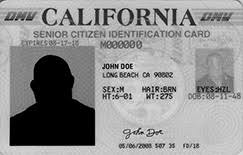 You must have an ID for everything now specially to have something notarized One of my pet peeves as a #notary is Identifying Senior’s who no longer drive and do not have a valid form of Identification. Recently I have had scenarios in which an important document needs to be notarized, & the form of Identification Presented is an expired Driver License, usually the rationale is ‘I stopped driving a year ago, so I didn’t renew it” or from the caregiver “my mother/father does not drive anymore so we let the DL expire”. Some seniors choose not to drive, which means the driver’s license – one of the most common forms of identification people carry – is expired. Lack of proper ID can become an issue if you need to get important documents notarized, like those dealing with real estate or estate planning. When it comes to signing off on important documents, a notary public will be required to validate the signature – which means a proper ID, no matter what age. The notary process will move quickly and easily if you have valid identification, and it’s even more convenient if you use a mobile notary. The purpose of notarization is to reduce the potential for fraud when parties are executing important documents. Therefore, the notary professional must have some way to verify identity to ensure that the signers are who they claim to be. Most of the time, the signatories will not be known to the notary professional, so proper ID is the best way to confirm identity. As more seniors are turning to mobile notary services who arrive onsite for document execution, it’s likely that you won’t know the notary public and must have ID on hand. The rules of different states vary on the types of identification that are acceptable for notary professionals. Some jurisdictions specify the documents a signer can use to prove their identity; others simply state that ID should have certain criteria, such as that it must be issued by state or federal government, must have a color photo of the individual presenting it, or must be signed by the person. If a state doesn’t designate a specific ID type, the notary public will typically require presentation of some form that allows them to compare physical appearance and signature to the document to be signed. IDs that are acceptable in every state.
Forms of identification that don’t feature both a photo and signature aren’t likely to qualify for purposes of notarization. They include, but aren’t limited to: Credit & Debit Cards Social Security Cards Birth Certificates These types of documents may contain your signature, but a notary public can’t confirm that the holder of the card is you without a picture. Senior ID Card—To qualify for a no fee senior citizen ID card, you must be 62 years old, or older ID card has a banner with the words “Senior Identification Card” on the front. Seniors who are no longer mobile, can apply for a California Identification Card Renewal by Mail Fill out form DL 410 and mail it to DMV Renewal by Mail Unit: PO Box 942890 Sacramento California 94290-0001 https://www.dmv.ca.gov/portal/wcm/connect/ecb08237-a493-479b-9141-4c9ae448e898/dl410id.PDF?MOD=AJPERES
1 Comment
Richard Snow
6/30/2022 10:42:43 am
My special needs brother, a senior is blind, cannot walk without assistance and is cognitively impaired.
Reply
Leave a Reply. |
Archives
May 2024
Categories |

 RSS Feed
RSS Feed